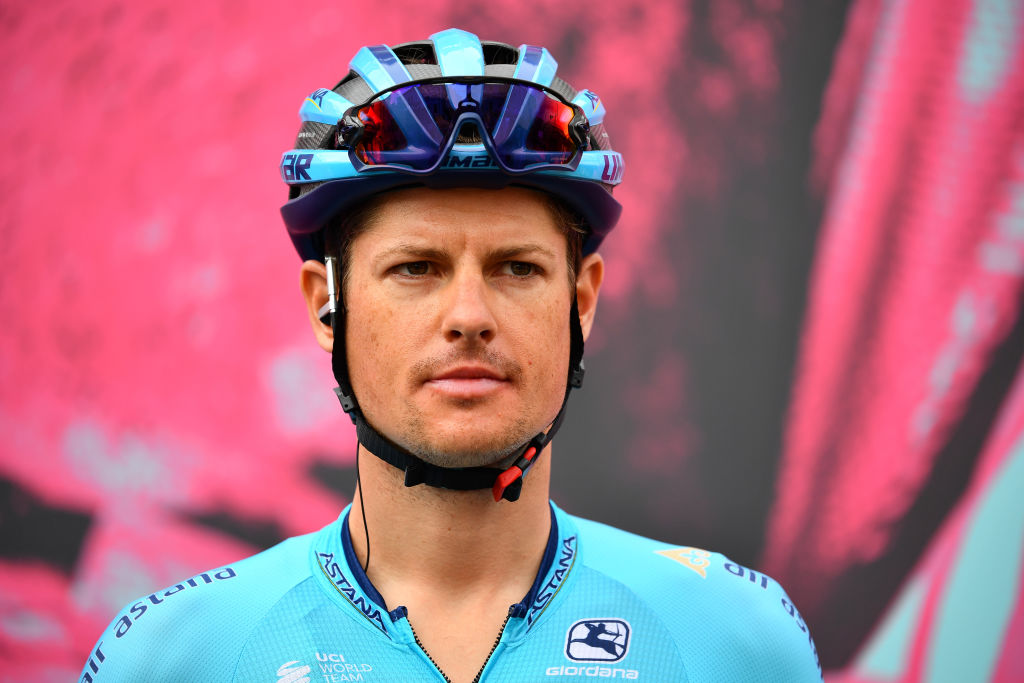Fuglsang: Nibali and I agree we won’t focus only on each other at Giro d’Italia
Dane looks ahead to ‘opportunity days’ ahead

Asked in his rest day press conference about apparent tensions with his former team leader Vincenzo Nibali on this Giro d’Italia, Jakob Fuglsang suggested they had been concocted by “the press and the journalists.” Maybe it was a different Jakob Fuglsang, then, who wrote the series of columns in Danish tabloid BT about Nibali and the Giro over the past few days.
For the record, BT’s Fuglsang pointed out that Nibali “can hardly greet me and chases after me quite a lot,” noting that he didn’t know if the Sicilian was “jealous, ambitious, or what.” Two days later, BT’s Fuglsang complained that Nibali’s Trek-Segafredo team had pushed on the pace when he punctured on stage 8, stating “I told [Nibali] he had better watch out the next time he stopped to pee.”
Ahead of stage 9 and again in his own press conference on Monday, Nibali looked to play down any tensions with his former teammate, while Astana’s Fuglsang – currently sixth overall and just four seconds behind Nibali – did the same shortly afterwards.
“I think the ‘war’ between me and Vincenzo is mainly one created by the press and the journalists,” Astana’s Fuglsang claimed on Monday. “They’d like to have that as an extra drama in the Giro.
"Me and Vincenzo, we talked shortly about it yesterday. We exchanged a few messages the day before. We both agree that we want to do a nice race and we won’t focus only on each other," Fuglsang added.
“We talked about it. I think the situation was clear and we’ll move on from here and we will see what the race brings. I think none of us has the strongest team here, so we will also probably find ourselves alone in the high mountains so it might be that we make an alliance instead of a war.”
Fuglsang is correct in one sense, of course. The press is indeed always grateful for some additional drama in a bike race, and rumblings of discontent between two contenders will inevitably attract considerable interest. The polemica quotient is an important consideration in any Giro.
Get The Leadout Newsletter
The latest race content, interviews, features, reviews and expert buying guides, direct to your inbox!
In a Giro where the press room has had to make do with physically-distanced (or sometimes simply non-existent) mix zones, insight such as that provided by Fuglsang’s columns has been in notably short supply. Perhaps he shouldn’t be so shy about claiming credit for his side gig with BT.
Kelderman among top competition
As the Giro resumes on Tuesday, Fuglsang sits in sixth place overall, 1:01 down on maglia rosa João Almeida (Deceuninck-QuickStep) and four seconds behind Nibali. The 35-year-old rider expressed satisfaction with how his race has unfolded since a most trying opening weekend in Sicily, when he lost teammates Miguel Ángel López and Aleksandr Vlasov to illness and injury, and also conceded ground amid adverse wind conditions in the stage 1 time trial.
“Apart from the time trial, it was a good week,” said Fuglsang. “I managed to gain back a bit of time on some of the other GC guys, apart from [Wilco] Kelderman. I wish we still had Vlasov and López, but I can’t complain with the work the guys are doing.”
Fuglsang has spent much of his Grand Tour career in the service of others – he helped Nibali to win the 2014 Tour de France and 2016 Giro – while he has been beset by ill fortune in three-week races in recent years. Despite his track record, however, the Dane entered this year’s Giro with lofty ambitions, and they haven’t diminished in the opening nine days. He impressed at Mount Etna on stage 3 and was the best of the GC men along with Kelderman at Roccaraso on Sunday.
“I think my chances of winning the Giro haven’t gotten smaller,” Fuglsang said. “But there’s still some hard competition. I think especially Kelderman has shown himself to be very strong and maybe stronger than we would have thought. It’s still early in the race, but in my eyes, he’s one of the main favourites.”
Although the Giro doesn’t climb above 1,000 metres again until next Sunday’s summit finish at Piancavallo, there are potential pitfalls aplenty during the second week of the race, starting with the steep muri that punctuate Tuesday’s finale at Lido di Tortoreto. Fuglsang, winner of Il Lombardia in August, will surely seek out chances there, or on the route of the Nove Colli Gran Fondo around Cesenatico two days later.
“I think Tuesday can be an opportunity, but there’s still 10 kilometres from the last climb to the finish line, and it depends also a bit on the weather. There was a lot of headwind in the final yesterday, which makes it harder to make the difference,” said Fuglsang.
“We also have the Cesenatico stage, which from what I heard it should be very hard. There are opportunity days coming up, for sure. It’s about choosing the right moment to expend energy.”

Barry Ryan was Head of Features at Cyclingnews. He has covered professional cycling since 2010, reporting from the Tour de France, Giro d’Italia and events from Argentina to Japan. His writing has appeared in The Independent, Procycling and Cycling Plus. He is the author of The Ascent: Sean Kelly, Stephen Roche and the Rise of Irish Cycling’s Golden Generation, published by Gill Books.